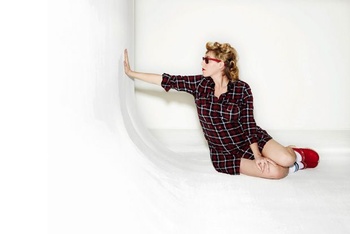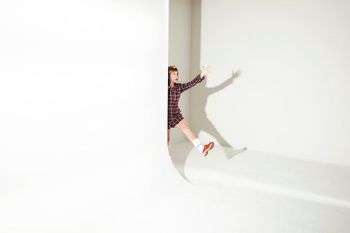(© Dean Chalkley)
One of the stars of this year’s Brussels Summer Festival, Martha Wainwright, daughter of folk icons Loudon Wainwright III and the late Kate McGarrigle, has been through an exceptionally turbulent time emotionally. But as befits a true singer-songwriter, she has plenty to sing and to say about it. “When you share it with your audience it’s no longer just about you.”
Put yourself in the position of the singer Martha Wainwright. Not only were her parents standard-bearers of Seventies folk, but she also had to take on her brother Rufus, three years older, a talented musical all-rounder, and much more mediagenic than his sister. With Come Home to Mama, her fourth studio album, however, Martha took a big step forwards last autumn. The record followed the most turbulent period of her life: first, she gave birth, in really difficult circumstances, to her first child; then barely two months later she lost her mother, who was one half of the folk duo Kate & Anna McGarrigle, to cancer. Every conceivable feeling experienced at the time – from pain and grief to anger to the beginning of acceptance – came together in an exceptionally candid album that, against her own expectations, did not turn out to be an introverted affair but was at times extraordinarily spirited, as if the darkest days of her life had given her new energy and a new lust for life.
Brussels Summer Festival: Martha Wainwright

The penetrating ballad “Proserpina” was the last song your mother wrote before she died. How difficult was it to record that particular track for your new album?
Martha Wainwright: It was very emotional, but not difficult, because I found consolation in it and had the feeling I was getting closer to my mother by doing it. I recorded it soon after she died, because I didn’t want anyone else to record it before me, but above all because the memory of how she sang it live was still at its most vivid. All of my mother’s songs were really for me and Rufus. But this felt like a final gift, a mother-daughter story. Precisely because this song has given my career an extra impulse, it seems as if she is still holding my hand.
The theme of the mythological figure of Persephone (the Greek equivalent of Proserpina), who symbolises new life replacing old, perfectly matches what happened to you. According to Greek antiquity, we have her to thank for the seasons.
Wainwright: That’s right. And her tale of death and rebirth, of the cycle of the seasons and of life, helps me to accept what happened. My mother read a lot about mythology in the last few years of her life. I suppose you do that when you are suddenly confronted with death. She wrote that song specially for our Christmas show at the Royal Albert Hall. Clever as she was, she called it a Christmas song, because it’s about the seasons. I thought that was brilliant.
You open the record with “I Am Sorry”. What are you apologising for?
Wainwright: Besides getting over a life-threatening birth and a heartbreaking death, I had also arrived at a point in my life and my marriage where I occasionally faced struggle. So it is a typical record of someone in her mid-thirties with different problems from people in their twenties. My husband is the victim of that sometimes, which is why I now gladly offer him my apologies. [Laughs]

(© Dean Chalkley)
Your husband, Brad Albetta, used to be your producer. This time you got together with the Japanese musician Yuka C Honda (Cibo Matto). Why?
Wainwright: Out of necessity. After the loss of my mother, which hit my husband terribly hard too, after bringing a baby into the world together, after buying a house together, and after having been on tour together, we would probably have killed each other if we had had to record a record together as well in that same period. [Laughs]
You often used to say that you really looked up to Rufus. Is that still true?
Wainwright: I was always terribly envious of him, until I realised that he is my greatest mentor. His dedication and ambition is something to hold onto. Since my mother is no longer there, the bond between us seems to have become stronger. Actually, on Come Home to Mama I realise that I have grown up. I never thought it would happen. It seems that it’s only when one of your parents is taken from you that you reach that point. And at the same time other anxieties seem to have faded away, such as that rivalry with my brother. I no longer wonder all the time, “Why is Rufus better?” or “Why is he more famous?” I’m more self-assured and free.
September will see the release of the concert documentary Sing Me the Songs that Say I Love You, a tribute to your mother for which you got together with your brother and musician friends like Antony and Norah Jones.
Wainwright: Rufus and I started talking about a possible tribute show just a few weeks after her death. That might sound strange, but that’s just what we do and what we know.
Your husband, Brad Albetta, used to be your producer. This time you got together with the Japanese musician Yuka C Honda (Cibo Matto). Why?
Wainwright: Out of necessity. After the loss of my mother, which hit my husband terribly hard too, after bringing a baby into the world together, after buying a house together, and after having been on tour together, we would probably have killed each other if we had had to record a record together as well in that same period. [Laughs]
You often used to say that you really looked up to Rufus. Is that still true?
Wainwright: I was always terribly envious of him, until I realised that he is my greatest mentor. His dedication and ambition is something to hold onto. Since my mother is no longer there, the bond between us seems to have become stronger. Actually, on Come Home to Mama I realise that I have grown up. I never thought it would happen. It seems that it’s only when one of your parents is taken from you that you reach that point. And at the same time other anxieties seem to have faded away, such as that rivalry with my brother. I no longer wonder all the time, “Why is Rufus better?” or “Why is he more famous?” I’m more self-assured and free.
September will see the release of the concert documentary Sing Me the Songs that Say I Love You, a tribute to your mother for which you got together with your brother and musician friends like Antony and Norah Jones.
Wainwright: Rufus and I started talking about a possible tribute show just a few weeks after her death. That might sound strange, but that’s just what we do and what we know.
When you were singing together in family sessions, you sang quite a few songs about each other.
Wainwright: Yes, but I used to always think, for example, that my father sang songs about me and his family, but then when I saw his audience laughing or crying, I realised that he was performing songs about their families and their lives and that it had nothing to do with me. [Laughs] When you share songs with your audience, they’re no longer just about you.
Did you really have any choice other than to become a singer? As a child did you never feel the need to break out of that singer-songwriter tradition?
Wainwright: All the time! [Laughs] I fought against it for a long time. But now that I have more responsibilities myself I realise that I am part of a tradition that spans generations. In folk music there has always been that kind of community. Since I was a child, Richard Thompson and Emmylou Harris used to drop in, and Rufus and I are continuing those artistic friendships with a younger generation. Even though we are tremendously individualistic artists, we will keep on surrounding ourselves with like-minded people.
Now that the Cohen songwriting genes have come into the family too, via Viva Katherine Wainwright Cohen, daughter of Rufus and his husband Jörn Weisbrodt (and surrogate mother Lorca Cohen, daughter of Leonard), the future seems to be assured.
Wainwright: I know! When people used to ask me whether I would like to see my little son Arcangelo grow up to be a singer, my first thought was, “No need, so long as he becomes happy, successful, and rich.” [Laughs] But when I was onstage again with Rufus recently, I knew for sure: this travelling circus mustn’t stop. The family business has to be carried on from generation to generation. If it stops, it’s as if they leave the farm and then the farm dies. Now that would be sad.
18/8, 19.00, Magic Mirrors
Brussels Summer Festival • 9 > 18/8, 1 day: €15/25, 10 days: €40, Kunstberg/Mont des Arts, Paleizenplein/place des Palais, Museumplein/place des Musées, www.bsf.be
Read more about: Muziek , Events & Festivals
Fijn dat je wil reageren. Wie reageert, gaat akkoord met onze huisregels. Hoe reageren via Disqus? Een woordje uitleg.